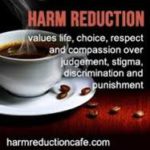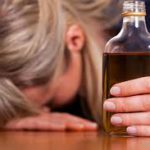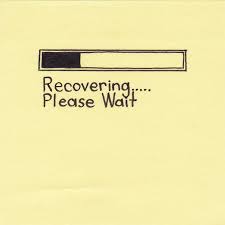…by April Wilson Smith…
I used to hate the word “recovery.” To me, it was a mark of shame, stating that I was permanently damaged and different from “normies,” as they call people without substance use problems in AA. Recovery signified a lifetime of isolation, avoiding social events and going to dull nightly meetings where people wallowed in the past. It also implied that I had a disease, which I never believed.
So I refused to use the word. If it happened to come up that I had had a problem with alcohol, I’d simply say, “That’s no longer an issue for me.” I wanted to erase the period of time when I had struggled to get over my alcohol problem, and make life a well-paved road without the giant bump of my alcohol crash and stint in rehab.
 Then I started to work in harm reduction. I founded a SMART Recovery meeting, and went on to become an officer in the Harm Reduction, Abstinence and Moderation Support (HAMS) group. I met people who were at all stages of the struggle, from still using to fresh out of rehab to 18 years without a problem. I met people who were deeply in pain.
Then I started to work in harm reduction. I founded a SMART Recovery meeting, and went on to become an officer in the Harm Reduction, Abstinence and Moderation Support (HAMS) group. I met people who were at all stages of the struggle, from still using to fresh out of rehab to 18 years without a problem. I met people who were deeply in pain.
As I witnessed their pain, I began to reconnect with my own. It had been too difficult, at first, to remember the pain of passing out in the street or finding out the next day what I had said or done the night before. I didn’t want to remember the horror of  withdrawing from alcohol more times than I can count, sometimes throwing up blood for days on end and nailed to the bed in a panic attack. I didn’t even want to remember those early days of abstinence when my senses first came back and I could smell the flowers in summer and taste blueberries and coffee as though for the first time.
withdrawing from alcohol more times than I can count, sometimes throwing up blood for days on end and nailed to the bed in a panic attack. I didn’t even want to remember those early days of abstinence when my senses first came back and I could smell the flowers in summer and taste blueberries and coffee as though for the first time.
 After almost two years and working with countless people with substance use problems, I could feel my own pain again. And I realized something: to deny that there is a period of time when the pain is acute, and when healing has to be a priority, is to deny an essential reality of people’s lives. Of my own life. That’s when I started to use the word “recovery” again. But I do not believe that “recovery” is a permanent state. With proper self-care, support, and meaning in life, one can heal.
After almost two years and working with countless people with substance use problems, I could feel my own pain again. And I realized something: to deny that there is a period of time when the pain is acute, and when healing has to be a priority, is to deny an essential reality of people’s lives. Of my own life. That’s when I started to use the word “recovery” again. But I do not believe that “recovery” is a permanent state. With proper self-care, support, and meaning in life, one can heal.
My path to healing was a jagged one. When I left a traditional Twelve Step rehab, I was grateful to be out of addictive crisis, but I was even farther away from finding my true self than I had been. In  rehab, we were taught to identify as “addict” and “alcoholic,” and told that all our problems were due to our “disease.” We did little to address the issues that drove our addiction. Instead, we were taught that the answer to all problems was to attend Twelve Step meetings and work the Steps.
rehab, we were taught to identify as “addict” and “alcoholic,” and told that all our problems were due to our “disease.” We did little to address the issues that drove our addiction. Instead, we were taught that the answer to all problems was to attend Twelve Step meetings and work the Steps.
I got home and dutifully did my 90 meetings in 90 days as instructed, but it didn’t feel right. Gradually, I discovered writers who saw addiction differently. First Marc, then onto Carl Hart, Johann Hari, and eventually Stanton Peele and Kenneth Anderson. I saw a new way of looking at addiction, not as a symptom of a disease or indication that I was damaged for life, but as a behavior over which I could have control.  As I read more, I gradually began to discover my own voice, and started to write. Reclaiming my own identity, not as an “alcoholic” but as a writer, activist and scholar was my way out, not only of addiction but of the narrow, confined life that rehab and AA had defined for me as “recovery.” And I found that my own painful experiences gave me a perspective that could help others. Today, having recovered means living a life that I don’t have to medicate away.
As I read more, I gradually began to discover my own voice, and started to write. Reclaiming my own identity, not as an “alcoholic” but as a writer, activist and scholar was my way out, not only of addiction but of the narrow, confined life that rehab and AA had defined for me as “recovery.” And I found that my own painful experiences gave me a perspective that could help others. Today, having recovered means living a life that I don’t have to medicate away.
Two years after my 28 day stay in rehab, I find myself writing about substance use and mental health full time, and I’m doing my PhD on harm reduction. I hope that my work can help people who are going through that difficult period of healing. By using the word “recovery,” I honor their pain, and I honor my own. I also honor our triumph over the pain.
My substance problem is not who I am, but it is an essential part of my life experience. It has given me insight into things I never would have known about, and a kind of empathy I never had before I woke up on the concrete.
I am grateful for recovery. I am also grateful for the ability to move on.

Leave a Reply